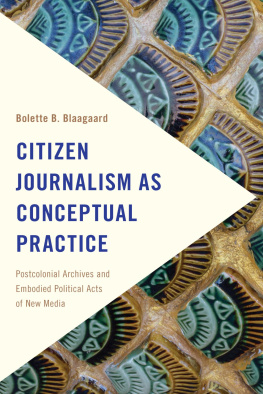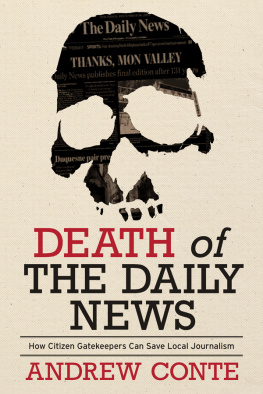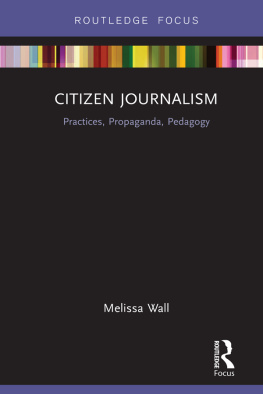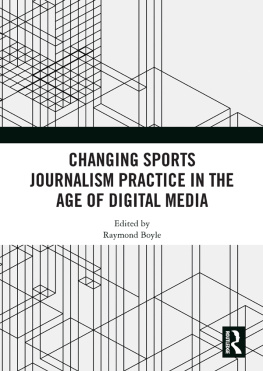Citizen Journalism as Conceptual Practice
Frontiers of the Political
Series Editor:
Engin Isin is Professor of International Politics, Queen Mary University of London (QMUL) and University of London Institute in Paris (ULIP). He is a leading scholar of citizenship studies and is a Chief Editor of the journal Citizenship Studies . He is author and editor of eleven books in the field, including Being Political and Citizens Without Frontiers .
This series aims to contribute to our understanding of transversal political struggles beyond and across the borders of the nation-state, and its institutions and mechanisms, which have become influential and effective means of both contentious politics and political subjectivity. The series features titles that eschew and even disavow interpreting these transversal political struggles with categories and concepts.
Postcolonial Transitions in Europe: Contexts, Practices and Politics edited by Sandra Ponzanesi and Gianmaria Colpani
Citizenship and Place: Case Studies on the Borders of Citizenship edited by Cherstin M. Lyon and Allison F Goebel
The Question of Political Community: Sameness, Logos, Space by Jonna Pettersson
Postcolonial Intellectuals in Europe: Academics, Artists, Activists and Their Publics edited by Sandra Ponzanesi and Adriano Jos Habed
Citizen Journalism as Conceptual Practice: Postcolonial Archives and Embodied Political Acts of New Media by Bolette B. Blaagaard
Governing Affective Citizenship: Denaturalisation, Belonging and Repression by Marie Beauchamps
Citizen Journalism as Conceptual Practice
Postcolonial Archives and Embodied Political Acts of New Media
Bolette B. Blaagaard
London New York
Published by Rowman & Littlefield International Ltd
Unit A, Whitacre Mews, 26-34 Stannary Street, London SE11 4AB
www.rowmaninternational.com
Rowman & Littlefield International Ltd.is an affiliate of Rowman & Littlefield
4501 Forbes Boulevard, Suite 200, Lanham, Maryland 20706, USA
With additional offices in Boulder, New York, Toronto (Canada), and Plymouth (UK)
www.rowman.com
Selection and editorial matter Bolette B. Blaagaard, 2018
All rights reserved . No part of this book may be reproduced in any form or by any electronic or mechanical means, including information storage and retrieval systems, without written permission from the publisher, except by a reviewer who may quote passages in a review.
British Library Cataloguing in Publication Data
A catalogue record for this book is available from the British Library
ISBN: HB 978-1-7866-0107-0
Library of Congress Cataloging-in-Publication Data
Names: Blaagaard, Bolette, author.
Title: Citizen journalism as conceptual practice : postcolonial archives and embodied political acts of new media / Bolette B. Blaagaard.
Description: London ; New York : Rowman & Littlefield International, Ltd., [2018] | Series: Frontiers of the political | Includes bibliographical references.
Identifiers: LCCN 2018005954 (print) | LCCN 2018008540 (ebook) | ISBN 9781786601094 (electronic) | ISBN 9781786601070 (cloth : alk. paper)
Subjects: LCSH: Citizen journalism. | Postcolonialism. | JournalismTechnological innovations.
Classification: LCC PN4784.C615 (ebook) | LCC PN4784.C615 B57 2018 (print) | DDC 070.4/3dc23
LC record available at https://lccn.loc.gov/2018005954

The paper used in this publication meets the minimum requirements of American National Standard for Information SciencesPermanence of Paper for Printed Library Materials, ANSI/NISO Z39.48-1992.
Printed in the United States of America
David Hamilton Jackson speaking at Grnttorvet, Copenhagen, 1915 . Reprinted courtesy of The Danish Royal Library.
Contents
Figure C.1 | David Hamilton Jackson speaking at Grnttorvet, Copenhagen, 1915 |
Page 2 of The Herald , 8 March 1916 |
Front page of The Herald , 3 July 1917 |
I would like to thank colleagues and friends for insightful and helpful comments on drafts of this books chapters. Some of the chapters are based on previously published articles and chapters, and I would like to thank the reviewers and editors for their work. I would like to thank the Danish Royal Library and the National Archives, my friends and colleagues in the United States Virgin Islands, as well as the team at Rowman & Littlefield for their collaboration and interest in the project. Finally, I thank Rosi Braidotti for her continued support and friendship. This book is dedicated to Johannes Benjamin.
Parts of chapters 2, 3 and 4 have been published in:
Cosmopolitan relations in the colonies: Redefining citizen journalism through a cultural historical reading of The Herald , St. Croix 191525, European Journal of Cultural Studies (2016), 117.
Reading The Herald today: Postcolonial notes on journalism and citizen media, in Sandra Ponzanesi and Gianmaria Colpani (eds.), Postcolonial Transitions in Europe: Contexts, Practices and Politics (Lanham, MD: Rowman & Littlefield, 2016), 23150.
Rosi Braidotti and Paul Gilroy, Questions of memory and cosmopolitan futures of Europe, in Sandra Ponzanesi and Adriano Habed (eds.), Postcolonial Intellectuals in Europe: Academics, Artists, Activists and Their Publics (Lanham, MD: Rowman & Littlefield, 2018).
Theory the seeing of patterns, showing the forest as well as the trees theory can be a dew that rises from the earth and collects in the rain cloud and returns to earth over and over. But if it doesnt smell of the earth, it isnt good for the earth.
Adrienne Rich, Notes towards a Politics of Location, 21314
In 1984, Adrienne Rich wrote Notes towards a Politics of Location, in which she argues for a grounded approach to theoretical work. Behind its lyrical wording, the above quote suggests an understanding of knowledge production that takes both its starting point and raison dtre in a grounded cartographic reading of particular circumstances. These particular circumstances give life to concepts, which in turn allow for a new understanding of the practice that served as the initial starting point. Similarly, in his work on cinema, Deleuze argues, A theory about cinema is not about cinema but about the concepts that cinema generates (Deleuze 1989, 280). Inspired by Rich and Deleuze, I argue in this book that citizen journalism is not about citizen journalism but about citizens and journalism as well as about how these concepts and practices formulate and generate political practices of subjectivity formation. Deleuze sees cinema as a practice of knowledge production on par with philosophical knowledge production, though generated through different events and understandings. I do not argue that citizen journalism is a philosophy but rather that looking at citizen journalism as a particular practice of knowledge production with a historical presence allows us to understand more about its role in society and about subjects political practices and agency. In arguing this, I furthermore draw upon philosophy of subjectivity, postcolonial theory, theories of citizenship and theories of political acts in order to take a new perspective on citizen journalism. This enables me to move beyond binary positions often evoked in empirical discussions about citizen journalism, such as the amateur producer of news versus the professional journalist, the importance of technological developments versus cultural determinism and the particular versus universal expressions. In other words, I wish to move to a position situated outside the dichotomies established by previous studies and long-held beliefs regarding an opposition between the practices of citizen journalism and professional journalism, which remain determining factors and points of reference. I wish to question the role and meaning of the citizen and the mnemonic processes, positions and substance of journalism when discussing citizen journalism.







 The paper used in this publication meets the minimum requirements of American National Standard for Information SciencesPermanence of Paper for Printed Library Materials, ANSI/NISO Z39.48-1992.
The paper used in this publication meets the minimum requirements of American National Standard for Information SciencesPermanence of Paper for Printed Library Materials, ANSI/NISO Z39.48-1992.